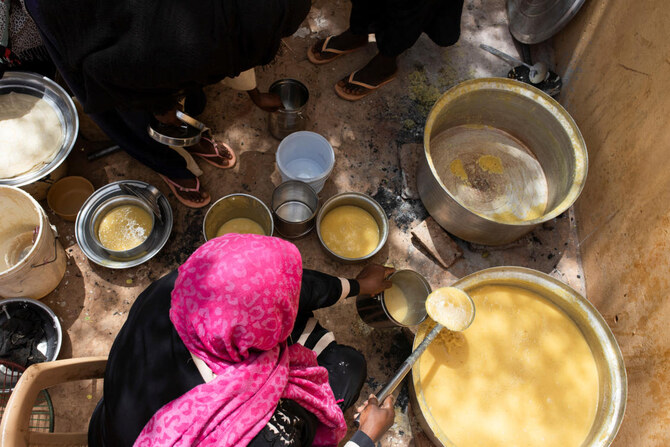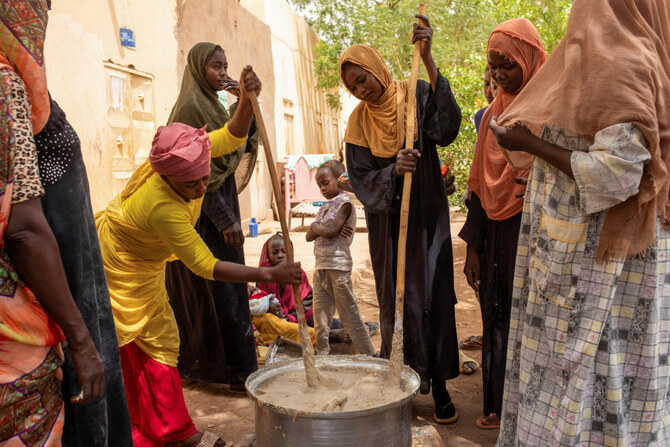KHARTOUM: Local volunteers who have helped to feed Sudan’s most destitute during 17 months of war say attacks against them by the opposing sides are making it difficult to provide life-saving aid amid the world’s biggest hunger crisis.
Many volunteers have fled under threat of arrest or violence, and communal kitchens they set up in a country where hundreds are estimated to be dying of starvation and hunger-related diseases each day have stopped serving meals for weeks at a time.
Reuters spoke with 24 volunteers who manage kitchens in Sudan’s central state of Khartoum, the western region of Darfur and parts of the east where millions of people have been driven from their homes since fighting erupted between the army and the paramilitary Rapid Support Forces (RSF).
International humanitarian agencies, which have been unable to get food aid to parts of Sudan at risk of famine, have ramped up support for such groups. But that has made them more of a target for RSF looters, 10 of the volunteers told Reuters by phone.
“We were safe when the RSF didn’t know about the funding,” said Gihad Salaheldin, a volunteer who left Khartoum city last year and spoke from Cairo. “They see our kitchens as a source of food.”
Both sides have also attacked or detained volunteers on suspicion of collaborating with their opponents, a dozen volunteers said.
Most of the volunteers spoke on condition of anonymity for fear of retaliation.
One volunteer in Bahri, a city that together with Khartoum and Omdurman makes up Sudan’s greater capital, said troops in RSF uniforms stole the phone he used to receive donations via a mobile banking app along with 3 million Sudanese pounds ($1,200) in cash intended for food in June.
It was one of five incidents this year in which he says he was attacked or harassed by paramilitary troops who control neighborhoods where he oversees 21 kitchens serving around 10,000 people.
Later that month, troops burst into a home housing one of the kitchens in the middle of the night and stole sacks of sorghum and beans. The volunteer, who had been sleeping there, said he was bound, gagged and whipped for hours by troops who wanted to know who was funding the group.
Reuters could not independently verify his account, but three other volunteers said that he reported the events to the rest of the group at the time.
The frequency of such incidents increased as international funding for communal kitchens picked up heading into the summer, according to eight volunteers from Khartoum state, which is mostly controlled by the RSF.
Many kitchens do not keep data on attacks, while others declined to provide details for fear of drawing more unwanted attention. However, volunteers described to Reuters 25 incidents targeting their kitchens or volunteers in the state since July alone, including more thefts and beatings and the detention of at least 52 people.
Groups that run kitchens there have announced the deaths of at least three volunteers in armed attacks, including one they said was shot and killed by RSF troops in Khartoum’s SHajjarah neighborhood in September. The identities of the other assailants were not immediately clear, and Reuters could not verify the accounts.
“Community kitchens in Sudan are a lifeline for people who are trapped in areas with ongoing conflict,” said Eddie Rowe, the UN World Food Programme’s country director in Sudan.
“By supporting them, WFP is able to get food into the hands of hundreds of thousands of people at risk of famine, even in the face of severe access constraints,” he told Reuters, saying the safety of aid workers must be guaranteed.
The RSF and Sudanese Armed Forces did not respond to questions for this article. However, the RSF has previously denied targeting aid workers and said any rogue elements who did so would be brought to justice.
The military has also said it does not target aid workers, but anyone who collaborates with the “rebellious” RSF is subject to arrest.
Marauding troops
UN officials say more than half of Sudan’s population – 25.6 million people – are experiencing acute hunger and need urgent assistance. In the worst-hit areas, residents displaced by fighting or under siege in their homes have resorted to eating dirt and leaves.
Local volunteers founded hundreds of kitchens early in the war that served hot meals — typically a meagre porridge of sorghum, lentils or beans — once or twice a day. But as food prices soared and private donations dwindled, some had to close or reduce services to as little as five times a month.
In North Darfur state, a group that runs kitchens in a camp housing half a million people displaced by ethnically driven violence has repeatedly had to stop serving meals due to insufficient funds, a volunteer there said. A global authority on hunger crises said in August that the conflict and restrictions on aid deliveries have caused famine in the Zamzam camp.
Many communal kitchens are operated by a loose network of community groups known as emergency response rooms, which have tried to sustain basic services, such as water and power, and distribute food and medical supplies.
Both the army and RSF distrust these groups, in part because they include people who were members of grassroots “resistance committees” that led pro-democracy protests during the uprising that toppled former autocrat Omar Al-Bashir in 2019. The volunteers who spoke to Reuters said the objectives of the emergency response rooms are purely humanitarian.
The army joined forces with the RSF to derail the political transition that followed Bashir’s ouster by staging a military coup two years later, but rivalries between them erupted into open warfare in April 2023.
In the worst-hit areas, local volunteers said they were now being targeted weekly or every few days by marauding troops, compared to roughly once a month earlier in the year. Some have started hiding food supplies at different locations to avoid being cleaned out by a single raid.
Reuters spoke to nine volunteers who fled various parts of the country after being targeted by the warring sides.
“These attacks are having a huge negative impact on our work,” Salaheldin said from Cairo. “We are losing our volunteers who are serving their communities.”
In areas where the army retains control, six volunteers described arrests and surveillance that they said drove away people who had helped run kitchens, reducing their capacity to operate.
A UN fact-finding mission discovered that, of 65 cases tried by army-convened courts against alleged “commanders and employees” of the RSF as of June, 63 targeted activists and humanitarian workers. They included members of emergency response rooms, the mission said in its report.
Both sides have deployed siege-like tactics to prevent food and other supplies reaching their opponents, according to relief workers. The RSF and allied militias have also looted aid hubs and plundered harvests, they say.
The warring parties have traded blame for delays in the delivery of food relief, while the RSF has denied looting aid.
Military chief General Abdel Fattah Al-Burhan and RSF leader Mohamed Hamdan Dagalo both said in September that they were committed to facilitating the flow of aid.
Donor reticence
As hunger spreads, emergency response rooms have set up 419 kitchens that aim to serve over 1 million people daily in Khartoum state alone, said Abdallah Gamar, a state organizer. But volunteers have struggled to secure the $1,175,000 needed every month. In September, they received around $614,000, Gamar told Reuters.
In the beginning, most of their support came from the Sudanese diaspora, but the resources of these donors have been depleted, Gamar said.
Aid workers said many foreign donors hesitated to fund kitchens because the groups running them are not registered with the government and often use personal bank accounts.
“There’s a lot of risk aversion when it comes to supporting unregistered platforms,” said Mathilde Vu, the Norwegian Refugee Council’s advocacy manager for Sudan.
Her organization began supporting local responders in Sudan last year, she said. “Now we have seen that a lot of NGOs, UN agencies and donors are starting to realize that we cannot do any humanitarian response — we can’t save lives — without them.”
Some donors are now working through registered intermediaries to get funding to communal kitchens. The WFP, for example, began partnering with local aid groups in July to help some 200 kitchens provide hot meals to up to 175,000 people daily in greater Khartoum, spending more than $2 million to date, said spokesperson Leni Kinzli.
Volunteers welcomed the support but said it can take weeks for money to filter down to kitchens through intermediaries. Cumbersome reporting requirements add to the delays, they said.
“The kitchens work in a sporadic way — there’s no consistent funding,” said Mohamed Abdallah, spokesperson for an emergency response room south of Khartoum. He said his group sometimes has only enough money to provide meals once a week, including in neighborhoods at risk of famine.
Justin Brady, who heads the UN Office for the Coordination of Humanitarian Affairs in Sudan, said donors need safeguards to ensure funds are used for their intended purpose but have taken steps to simplify the process.
Meanwhile, needs continue to grow.
The arrival of the rainy season over the summer brought flash floods and a heightened risk of deadly diseases such as cholera and malaria, stretching resources even thinner, volunteers said.
Sudan’s currency has fallen around 300 percent against the dollar on the parallel market during the war, and food prices have risen by almost as much, according to WFP surveys.
“In neighborhoods where we had one kitchen, we now need three more,” said Hind Altayif, spokesperson for volunteers in Sharq Al-Nil, a district adjacent to Bahri where she said several people were dying of hunger each month. “As the war goes on, we’ll see more people reaching rock bottom.”
In one Bahri neighborhood, people line up twice a day with bowls and buckets to collect ladles of gruel prepared over a fire in the courtyard of a volunteer’s home. Standing among them are teachers, traders and others cut off from livelihoods.
“We don’t have any food at home because we don’t have the money,” said a 50-year-old housewife, who like others interviewed requested anonymity for safety. “We rely on the community kitchen ... We don’t have an alternative.”

























